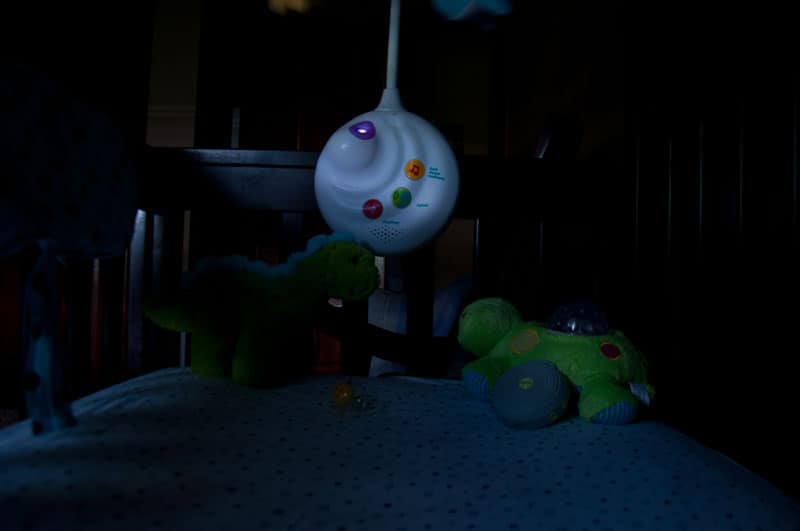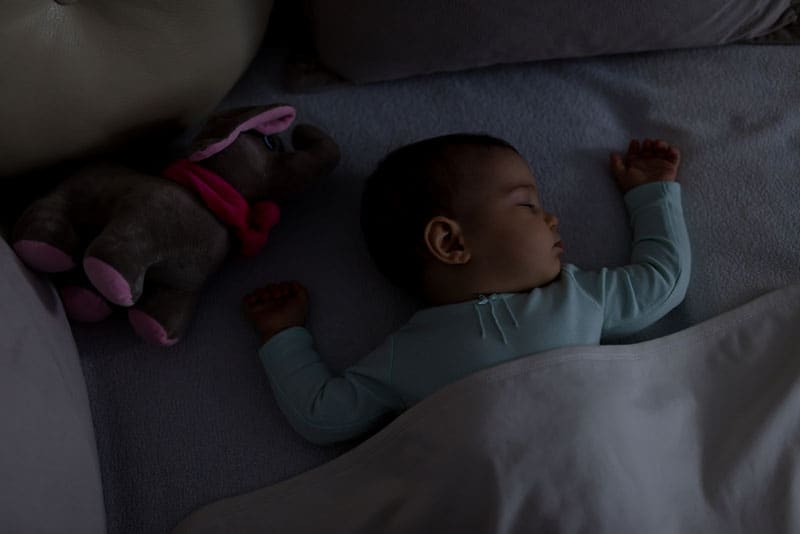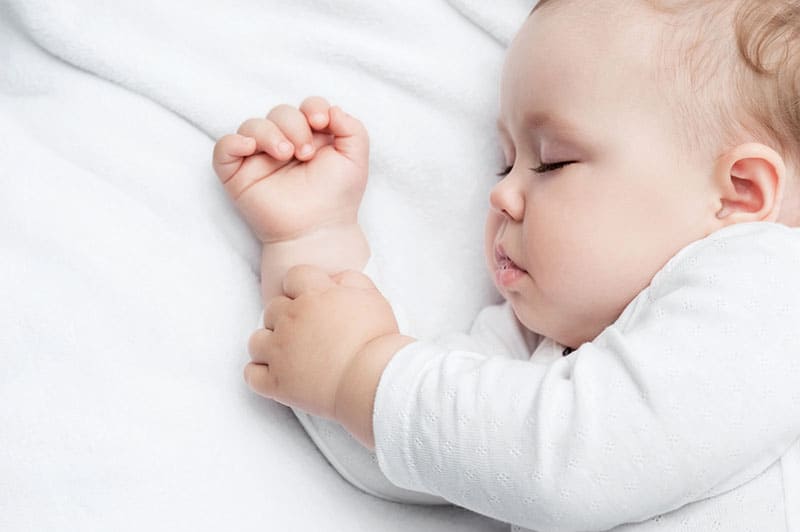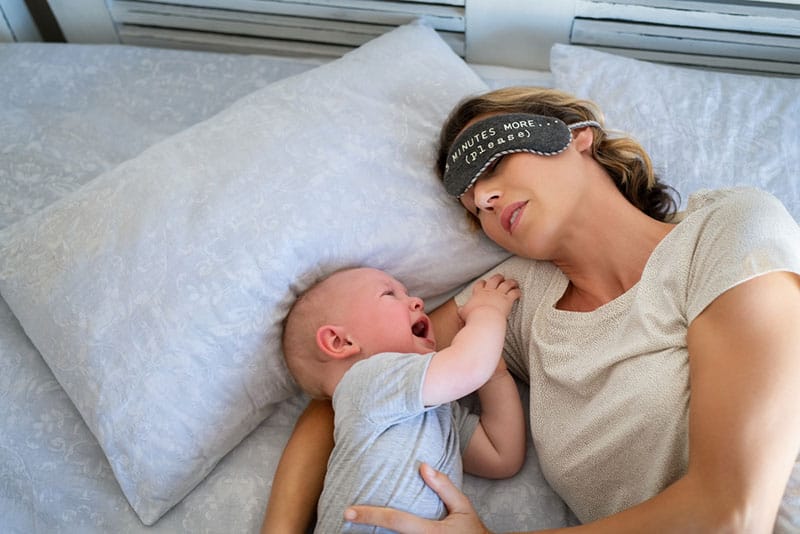Is your baby waking up too early and refusing to go back to sleep?
Like any other parent going through this uncomfortable stage, you must be exhausted and desperate for a solution. So, what can be done to fix this?
When a baby wakes up early every day, around 5 AM, the key to fixing it is to first identify the root of the problem.
Some babies might be going to bed too tired while others might be bothered by external factors, such as light or noise.
After you identify the cause of the early wakings, you need to work to eliminate it.
Perhaps you will need to change the baby’s nap schedule or install blackout curtains to prevent light from entering the nursery and causing an early waking.
Some parents have found a white noise machine to be very helpful in getting their baby to sleep in the early hours of the morning, meaning that there is a solution no matter what kind of parenting style you prefer.
Teaching your munchkin how to sleep in can be a challenging endeavor, but not impossible, and I’m here to help you every step of the way.
What makes an early wake up call?

Generally speaking, babies are early risers. New parents are used to early morning wakings and feeling tired throughout the day.
For some, their baby wakes up every hour, which is a problem of its own.
However, there is a specific time that constitutes an early waking, namely around 5 AM.
It’s normal for your little one to wake up around that time for a feed or a diaper change but she should also be able to go back to sleep afterward.
If she doesn’t, then you have an early riser on your hands. Anything earlier than 5 AM is considered a night waking.
Regardless of age, most kids rouse from their sleep between 6 AM and 7:30 AM, no matter how much daytime sleep they get or how many hours you put into sleep training.
It might be frustrating now but before you realize it, your baby will be a teenager that probably won’t want to get out of bed in the morning – so have some patience, mama!
Why is my baby waking up in the early morning?
There are many reasons why a child wakes up too early. Sometimes it’s not just a case of the child being prone to early morning wakings.
Teething or a change of environment could be the reasons behind your baby’s early wake up calls, for example.
Here are some of the top reasons why your baby keeps waking up too early:
1. Your baby is teething

As a rule of thumb, the majority of babies start teething when they are 6 months of age, although this can happen earlier or later in many cases.
One of the main symptoms of baby teeth growing is a disturbed sleep schedule and your baby might start waking up at odd hours. She might also find it hard to fall asleep.
This process is accompanied by many other symptoms, including crankiness, gum inflammation, excessive drooling, and even a slightly higher temperature.
Thankfully, there are numerous remedies you can try to soothe the symptoms and make this period easier for both you and the baby. Some can even help the baby sleep better, too.
2. Not getting enough sleep

It’s perfectly normal to think that the cause of this issue is the baby getting too much sleep.
But a sleep schedule where the baby doesn’t get enough sleep can be at fault, too.
A 6-month old baby should be sleeping between 12 and 15 hours a day, divided into daytime naps and nighttime sleep.
When your little one doesn’t sleep enough in a period of 24 hours, she can become overtired and wake up earlier than usual.
Too little sleep actually causes stress for the baby and the release of a hormone called cortisol.
The same hormone is produced by adults in stressful situations and it’s also known as the “stress hormone”.
Cortisol is responsible for keeping our bodies in a state of alarm, so relaxing and settling down for bed is much harder with it running through our system.
Even when an overtired baby falls asleep, she can still wake up earlier than usual.
This is because cortisol still remains in the body and once levels of melatonin, also known as the “sleep hormone”, begin to drop in the early hours of the morning, the baby wakes up.
The key to preventing the baby from becoming too tired is understanding her sleep cues. These include:
• spacing out;
• rubbing her eyes;
• playing with or rubbing her ears;
• wanting to stay close to mom or dad.
Crying, irritability and yawning are already signs of an overtired baby so you shouldn’t wait until they appear to start settling your little one to sleep.
Try scheduling an earlier bedtime, which should help prevent her from waking up in the early morning hours.
Although it sounds counterintuitive, it might just be the secret to getting extra sleep in the AM.
3. Going to bed too early

On the flip side, early bedtimes can also equal early wake up calls.
Your baby’s sleep routine might include nap times that are earlier in the day and solving this issue might require a complete overhaul of your child’s sleep patterns – I’ll talk about this further down.
You can slowly introduce a later bedtime by postponing it for about 10 minutes every night and see whether it yields the desired results.
Make sure to adjust nap times accordingly so that they are also later in the day.
4. Changes to your baby’s sleep environment

If you find that your baby has turned into an early bird all of a sudden, consider whether there have been any substantial changes to warrant an early rising.
Even adults have trouble adjusting to sleeping in new environments so it should come as no surprise that the same happens to babies.
Traveling and visiting family and the like can disrupt your baby’s natural circadian rhythm and it might take a while for it to go back to normal.
5. Your baby is hungry or needs a diaper change

Hunger and a dirty diaper have one thing in common – plenty of discomfort.
As a result, your munchkin could wake up earlier than usual to let you know how she’s feeling.
When it comes to the baby waking up due to a full diaper, opt for a nighttime brand with higher absorbency that won’t act as an early morning alarm clock.
If you are certain that your little one isn’t waking up early due to overtiredness or another reason, but rather due to hunger, then you can give her an extra feed during the day.
Alternatively, you can do what is known as a dream feed, meaning that you will feed the baby around 10 or 11 PM while she’s sleeping.
Don’t worry that this could wake her up as most babies will stay asleep during their dream feed.
6. Your baby is sick

Fighting off illness or infection is difficult work for the human body, which is why we tend to sleep more when we’re feeling under the weather.
Another consequence of illness, however, can be sleep problems because a change to the baby’s everyday schedule is bound to lead to disruptions.
Your baby might stop sleeping through the night, spend more time napping than usual, or wake up early.
After the illness has passed, however, her sleep schedule should go back to normal.
7. Your baby is experiencing a sleep regression

As a parent, it can be challenging when your baby, who was sleeping so well, seems to forget all about her sleep cycles.
Waking up in the middle of the night or early morning and being irritable at naptime are all signs of a sleep regression.
Sleep regressions happen at different stages – usually at 4, 8, and 18 months. They can last anywhere from 3 to 6 weeks.
Although this seems like a long period of time, the most important thing is that the sleep regression is temporary.
It’s the result of an onset of developmental milestones and there’s not much that can be done about it.
To soothe your baby to sleep during this time, you can use tactics you’ve employed before but it will take longer for your baby to settle down.
7 ways to prevent your baby from waking up too early
When mom and dad don’t get enough rest during the night because of their baby’s tendency to wake up early, it can cause frustration for the entire family.
Exhaustion is no joke, especially if you have other kids to take care of and that need their night sleep, too.
If you are a working mama by day, you might find it very hard to focus on your job, leading to uncomfortable situations in the workplace.
Here are some effective ways of dealing with your baby waking up too early:
1. Get a white noise machine

Not all mamas are fans of white noise machines, sleep projectors, or baby night lights to help their little ones fall asleep.
The biggest argument against such devices is that the baby could become too dependent on them to settle down, which can be troublesome when the device is not available for whatever reason.
Still, there is no denying that a white noise machine works like a charm for many babies and there are numerous parents who rely on one for their child’s bedtime routine.
It is helpful for night waking and early morning wakings, too.
As white noise works well to block out noises coming from the outside such as traffic, it can help your baby sleep that extra hour in the AM without rousing you from your bed.
For safety reasons, place the device a minimum of 7 feet away from your child’s bed or crib.
2. Block out the lights

Between 4 AM and 6 AM, the baby is in a state where she could be easily woken by sounds or lights.
The night has almost passed and she has been sleeping for several hours already, so she is not in the state she was in before bedtime.
The morning light signals to our bodies that it’s time to wake up and get started with our day. But as adults, we want to get a few more hours of sleep before getting up.
Babies don’t have this ability and might start their awake time the minute light makes it through their window.
Getting blackout blinds or curtains is an easy way to fix this. You can even combine it with a white noise machine if you’d like.
3. Wait the early waking out

When your baby wakes up at the crack of dawn, try to avoid going to her room right away and wait for a few minutes.
She might be able to soothe herself enough to go back to sleep but this won’t happen if you walk in there right away and start the day.
This will only teach the baby that 5 AM is an acceptable time to wake up, making it even more difficult to put a stop to this habit, especially if you feed her right after you get her out of bed.
Her body will learn to be hungry at that hour, guaranteeing that she will continue with her early wakings.
If she is crying, you can walk in without turning on the lights and give her a pacifier to calm her down.
Older babies above 12 months of age can play with plush toys in their crib until it’s time to get up.
There are soothers that you can hang on the side of the crib to provide a little bit of entertainment for your baby until you can get up.
The key is to act like your child has just woken up in the middle of the night and not morning.
Doing the contrary will just make sure she keeps repeating this behavior in the future, making it necessary for her to learn to occupy herself.
Of course, if your child is wailing at the top of her lungs you should calm her down because she could get too upset to go back to sleep.
4. Change the baby’s nap schedule

It’s clear that babies need plenty of sleep in a 24 hour period. As they grow, the amount of sleep a baby needs changes.
After these changes take place, but if the nap schedule stays the same, you may find yourself experiencing some extremely early mornings.
Depending on your child’s age, she might need less sleep during the day.
For example, a baby between 12 months and 18 months of age is ready for a nap transition, where she will stop taking her morning nap and just have one in the afternoon.
An age-appropriate nap schedule is important because it ensures the baby stays asleep until a reasonable hour.
If you’re not sure just how much sleep your child is getting, track her sleeping habits for a few days and compare it to the recommended sleep guidelines for her age group.
For example, a 6-month old can have her first nap at 9:30 in the morning, and her last nap at 2 in the afternoon.
Each nap can last for an hour and a half. But a 14-month old will be perfectly fine with just one nap a day.
If your little one has become prone to earlier morning wake-ups, watch out for the following signs as they are a clear indicator that you need to change her nap schedule:
• She sleeps through the first nap but shows fussiness when you try to put her down for the afternoon nap;
• She doesn’t sleep through the second nap in its entirety and gets too tired by the time she’s supposed to go to bed;
• If she’s entertained in the morning, she doesn’t show signs of wanting to go to sleep.
In the majority of cases, adjusting the baby’s sleep routine during the day works like a charm when it comes to the baby waking up too early.
However, changing a baby’s daily sleep routine is not a one-day job and takes time, so arm yourself with plenty of patience.
The change from two naps to just one nap a day is usually the most difficult for parents to implement.
This is because it’s hard for the baby to stay awake until her afternoon nap so it’s best to first move it up earlier in the day and slowly push it back.
Give yourself and your baby time to adjust – don’t give up after just a few days.
5. Make it clear when it’s time to rise and shine

Making the distinction between when it is and when it’s not time to rise and shine can easily break your baby’s early waking habit.
Even if the baby has woken up early, let her play or self-soothe in her crib for as long as possible.
Then, at your desired time, walk into the room and say “Good morning” in a happy voice, open the blinds or pull the curtains back to let light in, and make it clear that it’s time to start the day.
Stick with this schedule for a few days and you will slowly begin to see a positive change.
6. Try a sleep training method

Since a baby waking up too early is a part of a larger sleep issue, sometimes the best way to treat it is through a method of sleep training.
One of the most important things about training the baby for sleep is to not introduce it only when she awakens in the early hours of the morning or in the middle of the night because it’s not likely to work at that point.
Any new method is best introduced at bedtime when your munchkin is already tired and needs to catch up on some sleep.
Many experts recommend the Drowsy But Awake method which ensures the baby goes to bed in a state where she is aware of what’s going on but is drowsy enough to drift off by herself.
The best time to implement this method is around 6 months of age. When trying it out for the first time, make sure that the baby has had good naps that day.
Then, do a calming night-night routine with your little one half an hour before bedtime. It can include a nice bath and a snuggling session.
When it’s time to go to bed, place the baby in her crib, and turn off the lights. Ideally, she will drift off within 20 minutes.
If this happens quickly, then it means that the baby was too tired to self-soothe so you should keep trying until the baby learns how to do this on her own.
It’s important for your little one to learn self-soothing techniques because when she has an early waking, she will be able to be alone in her crib and soothe herself to sleep without crying out.
The same goes for night wakings.
As this is a skill babies need to develop over time, don’t be discouraged if it doesn’t work right away but keep trying until you see progress. But once it does work, you will be one very happy family.
7. Talk to a sleep consultant

There is no shame in deciding to talk to a sleep consultant about your morning waking woes.
A sleep consultant is someone who is specially trained in helping babies learn how to fall asleep on their own and guiding the parents through the process.
These consultants can help you with toddler sleeping troubles, too.
But just because a consultant suggests a method, it doesn’t mean you are obliged to go with it.
In fact, you are always free to say that a particular method of training a baby for sleep makes you feel uncomfortable.
Do your research and inquire about the methods they use before hiring them.
Their services range from offering consultations by phone, including calls and texting, or staying with the family for a number of days to get the full picture.
Then, they will give you tailored instructions to implement with your child. There are consultants who are specially trained to help parents of twins or children with special needs.
Don’t think of this as a waste of money – more often than not, an outsider can see things you can’t or didn’t think of, so give it a try.
Final thoughts

Dealing with your baby waking up too early can be a real test for your sanity – I’m sure any parent who has experienced it will confirm this.
Sadly, there is no one size fits all solution to this problem and it will take some trial and error until you discover the right way, especially if this is your first child.
Finding the cause of the early morning wakings is the first step to getting your baby to sleep longer.
Most of the time, parents don’t realize that their little one is going to bed overtired and too wound up to sleep later in the morning.
Changing your child’s nap times can work like a charm, too.
As your munchkin gets bigger her sleeping needs change, so a 5 AM waking could be an indication that some adjustments are in order.
If all else fails, don’t be afraid to reach out to a sleep consultant who is trained to provide sleep-deprived mamas with invaluable and custom advice to help them weather the storm.
I hope you were able to gain new insights into why your baby is waking up so early and have found some new solutions to try.
Until next time.
Like this post? Please share or pin it for later. You can also stay in the loop and follow us on Facebook, Instagram and Pinterest.

This post contains affiliate links. Please see our full disclosure or more info.

